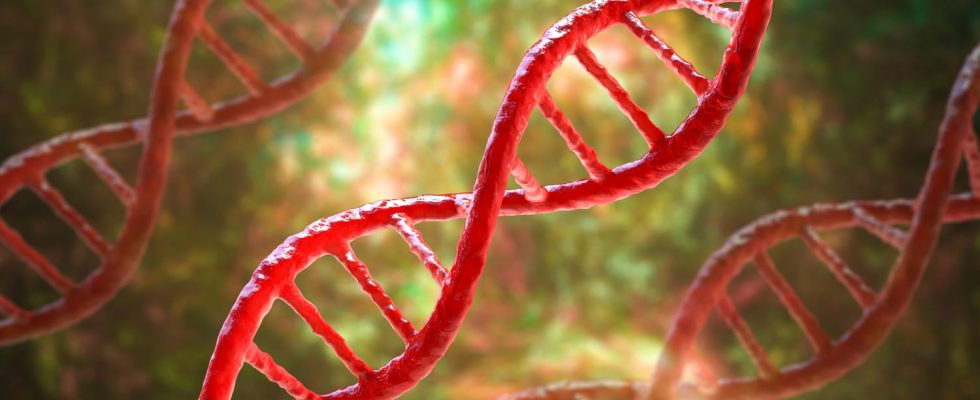Klinefelter syndrome is caused by a chromosomal abnormality that is not hereditary. It is characterized by the presence, in male subjects, of an extra X chromosome. In adulthood, men who are carriers are affected by infertility.
Definition: what is Klinefelter syndrome?
Klinefelter’s syndrome is a chromosomal abnormality that only affects boys and which corresponds to the presence of an extra X chromosome. “This anomaly is quite common since it concerns 1 in 500 to 600 births“says Véronique Kerlan, head of the endocrinology, diabetes and metabolic disease department at Brest University Hospital.
What is the cause of Klinefelter syndrome?
This extra chromosome is transmitted by mother or father, while neither parent is a carrier of the syndrome. “The origin is accidental, linked to a nondisjunction of sex chromosomes during meiosis“precise Public Health France. As a reminder, meiosis corresponds to a double cell division which allows the formation of gametes (spermatozoa and oocytes).
What is the karyotype of a person with Klinefelter syndrome?
The karyotype of a patient with Klinefelter syndrome presents an extra X chromosome, with 47 and not 46 chromosomes. The karyotype of these patients is 47,XXY.
“Klinefelter syndrome cannot be treated”
What are the symptoms of Klinefelter syndrome?
According to our expert, only about 25% of cases would be diagnosed. “The clinical expression of this syndrome is very variable and more or less visible“, specifies the endocrinologist.
► In children: Approximately 10% of cases would be diagnosed in childhood : “we can find a delay in learning, in particular language, spatio-temporal landmarks. Some patients may also have memory difficulties and behavioral problems“, details Véronique Kerlan. These delays improve as they are taken care of early enough. These children are also tall for their age and exhibit greater than normal lower limb growth. These clinical signs are not systematic.
► In adolescents: puberty is often slightly later in adolescents with Klinefelter syndrome. The testicles do not grow enough. “It is this sign that must lead to the diagnosis and it is also the reason why so many boys go undiagnosed. In the past, a palpation of the testicles was systematic during the medical examination of military service. Currently, testicular palpation after puberty is very rare“. Another sign that can put you on the path: gynecomastia is a hypertrophy of the mammary glandular tissue.
► As an adult: “While they were not diagnosed in adolescence, we find these people in PMA. They are then diagnosed because Klinefelter syndrome is cause of infertility. Contrary to the other signs cited, this symptom is found in all patients.“Furthermore, the rate of testosterone is usually lower than normal, but not always: “il is sufficient in adolescence to trigger puberty. However, it is boys who show fewer secondary sex characteristics. Over time, this testosterone level will become too low and will require treatment.”notes Véronique Kerlan.
The various signs mentioned above and above all, small testicles in a young man, guide the diagnosis. Klinefelter’s syndrome is confirmed at the blood test for testosterone assay often too low for age. On the other hand, this always shows higher levels of gonadotropic hormones – produced by the pituitary gland – in carriers of the syndrome. We then realize a karyotype which confirms the diagnosis
What are the consequences for a person with Klinefelter syndrome?
“The announcement of this syndrome has a rather heavy psychological impact, on an adolescent but also on his parents. Infertility and the chromosomal abnormality worry“, explains Véronique Kerlan. This implies psychological support of the adolescent and his family. Carriers of Klinefelter syndrome are also more at risk of developing metabolic syndrome, breast cancer, osteoporosis, thromboembolic and/or autoimmune diseases. “This is why, it is necessary from the outset to raise awareness of the importance of physical activity, a healthy and balanced diet and sufficient calcium intake.“, notes the specialist. She adds: “gynecomastia is also monitored regularly in order to detect breast cancer as early as possible“. Patients’ testosterone levels are regularly monitored and injections will be prescribed if necessary. “Below 3 ng/ml of blood, it will be necessary to set up a treatment“, specifies the specialist.
Infertility care
Klinefelter syndrome in no way affects sexuality and the penis of the wearer is of normal size. “We do not find sperm in the spermogram, but thanks to the recent advent of TESE – testicular sperm extraction – we find sperm in 50% of patients. These are kept and possibly used during a PMA. It works half the time. Patients therefore have a one in four chance that the ART will be successful.“, explains the endocrinologist.
Can Klinefelter syndrome be treated?
Of chromosomal origin, Klinefelter’s syndrome cannot be treated. Only its symptoms can be taken care of.
What life expectancy?
Klinefleter’s syndrome does not affect life expectancy.
Thanks to Prof. Véronique Kerlan, head of the endocrinology, diabetes and metabolic disease department at Brest University Hospital, for her expertise.
